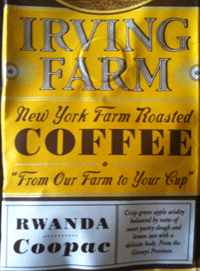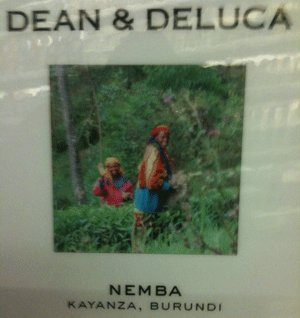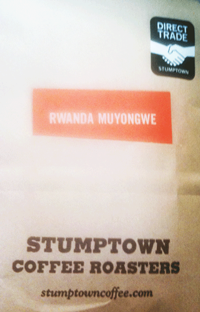The Great Manhattan Africa Luxury Coffee Tour
Welcome to Manhattan, tourists! Today's tour will accomplish three things: (1) you will find great coffee places, (2) you will find great coffees from Africa, and (3) you will end poverty in Africa. OK, both coffee people and aid people tend to exaggerate, so don't take (3) literally, unless you are from the Earth Institute.
[field name=iframe]
What better place to begin Manhattan coffee mania than at Stumptown Coffee Shop? This place takes African coffee so seriously, there are two varieties from Burundi and two from Rwanda, and if you give up your first born child, you can take back a pound of beans to Ohio.
Next is Café Grumpy, where they have a $10,000 machine to brew the clean, sweet, complex $12 cup of coffee from Nekisse, Ethiopia.
 Down 7th Avenue to Irving Farm (Go Rwanda!). {Full disclosure: I have a personal connection to Irving, but they're great anyway.} On to Third Rail, rated the best coffee in Manhattan by somebody, and also selling killer Yirgacheffe from the birthplace of coffee. And no, they don't have a bathroom -- this is Manhattan, you can pee when you get back to Iowa.
Down 7th Avenue to Irving Farm (Go Rwanda!). {Full disclosure: I have a personal connection to Irving, but they're great anyway.} On to Third Rail, rated the best coffee in Manhattan by somebody, and also selling killer Yirgacheffe from the birthplace of coffee. And no, they don't have a bathroom -- this is Manhattan, you can pee when you get back to Iowa.
Moving east we get to La Colombe, accidentally discovered by coffee-illiterate Chris Blattman next to his office. They sell coffee labelled Afrique, which I am pretty sure is in Africa. Sometimes there's a bit of a wait. What part did you not understand about "no bathroom"?
And then just a little further east is Gimmee Coffee, which turns Rwandan coffee into espresso so delicious and thick that you stir it with the hunting knife you brought from Idaho.
Even farther east is the Roasting Plant in a gentrifying former immigrant slum on the Lower East Side. It embodies the coffee-phile obsession with fresh roasted coffee, so your $24/lb Ethiopian Harrar turned brown right before we walked in.
 Now that you've drunk enough coffee, reach with your shaking hands for your Gold Card to buy yet more coffee beans. Whole Foods, Dean and Deluca, and even Murray's Cheese Shop sell Fair Trade, which is almost as good as Unfair Trade for transferring income from rich NYC to Kayanza, Burundi.
Now that you've drunk enough coffee, reach with your shaking hands for your Gold Card to buy yet more coffee beans. Whole Foods, Dean and Deluca, and even Murray's Cheese Shop sell Fair Trade, which is almost as good as Unfair Trade for transferring income from rich NYC to Kayanza, Burundi.
If you want to keep things simple, tourists, our last stop is Porto Rico Coffee Importers, which sells many African coffees, but no spiel on "helping the poor Africans".
Manhattan's pampered and discriminating coffee fanatics don't buy from African producers out of pity, they buy from African producers because they supply wonderful coffee.
Thanks for coming, tourists, have a nice trip back to Indiana. Don't forget mail order.
 From Aid to Equality
From Aid to Equality





